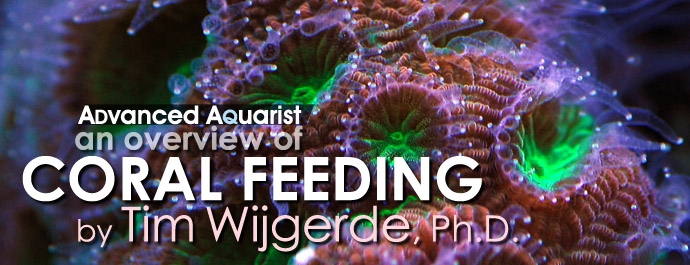Here is a standard article that seems to fit right in here:
Coral Feeding: An Overview

 reefs.com
reefs.com
The picture in the article shows that in the 1000 litre test tank:
98% of the food particles go to the skimmer when there are 2 coral colonies
71% of the food particles go to the skimmer when there are 40 coral colonies
92% of the food particles go to the skimmer when there are 2 coral colonies, when skimming is cut in half
55% of the food particles go to the skimmer when there are 40 coral colonies, when skimming is cut in half
"This trade-off between food availability and water quality can be circumvented by using plankton-saving filtration systems"
"Corals are able to feed on a wide range of particulate organic matter, which includes live organisms and their residues and excrements (detritus)."
"...bacteria [...] can be a major source of nitrogen." [corals need nitrogen]
"...when dry fish-feed or phytoplankton cultures are added to an aquarium, a part of this quickly ends up in the collection cup of the skimmer.
"...mechanical filters (which can include biofilters and sand filters) result in a significant waste of food."
"Detritus is a collective term for organic particles that arise from feces [waste], leftover food and decaying organisms. Detrital matter is common on coral reefs and in the aquarium, and slowly settles on the bottom as sediment. This sediment contains bacteria, protozoa, microscopic invertebrates, microalgae and organic material. These sedimentary sources can all serve as coral nutrients when suspended, especially for species growing in turbid waters. Experiments have revealed that many scleractinian corals can ingest and assimilate detritus which is trapped in coral mucus. Although stony corals may ingest detritus *when* it is available, several gorgonians have been found to *primarily* feed on suspended detritus."
"Dissolved organic matter (DOM) is an important food source for many corals. [...] scleractinian corals take up dissolved glucose from the water. More ecologically relevant, corals can also absorb amino acids and urea from the seawater"
Coral Feeding: An Overview

Coral Feeding: An Overview
At present, several factors which influence the growth of scleractinian corals in aquaculture have been identified. These are known as light, water flow, water quality, and nutrition. This article will focus on nutrition, and describe the various ways in which corals feed. It will summarize the...
The picture in the article shows that in the 1000 litre test tank:
98% of the food particles go to the skimmer when there are 2 coral colonies
71% of the food particles go to the skimmer when there are 40 coral colonies
92% of the food particles go to the skimmer when there are 2 coral colonies, when skimming is cut in half
55% of the food particles go to the skimmer when there are 40 coral colonies, when skimming is cut in half
"This trade-off between food availability and water quality can be circumvented by using plankton-saving filtration systems"
"Corals are able to feed on a wide range of particulate organic matter, which includes live organisms and their residues and excrements (detritus)."
"...bacteria [...] can be a major source of nitrogen." [corals need nitrogen]
"...when dry fish-feed or phytoplankton cultures are added to an aquarium, a part of this quickly ends up in the collection cup of the skimmer.
"...mechanical filters (which can include biofilters and sand filters) result in a significant waste of food."
"Detritus is a collective term for organic particles that arise from feces [waste], leftover food and decaying organisms. Detrital matter is common on coral reefs and in the aquarium, and slowly settles on the bottom as sediment. This sediment contains bacteria, protozoa, microscopic invertebrates, microalgae and organic material. These sedimentary sources can all serve as coral nutrients when suspended, especially for species growing in turbid waters. Experiments have revealed that many scleractinian corals can ingest and assimilate detritus which is trapped in coral mucus. Although stony corals may ingest detritus *when* it is available, several gorgonians have been found to *primarily* feed on suspended detritus."
"Dissolved organic matter (DOM) is an important food source for many corals. [...] scleractinian corals take up dissolved glucose from the water. More ecologically relevant, corals can also absorb amino acids and urea from the seawater"
Last edited:













